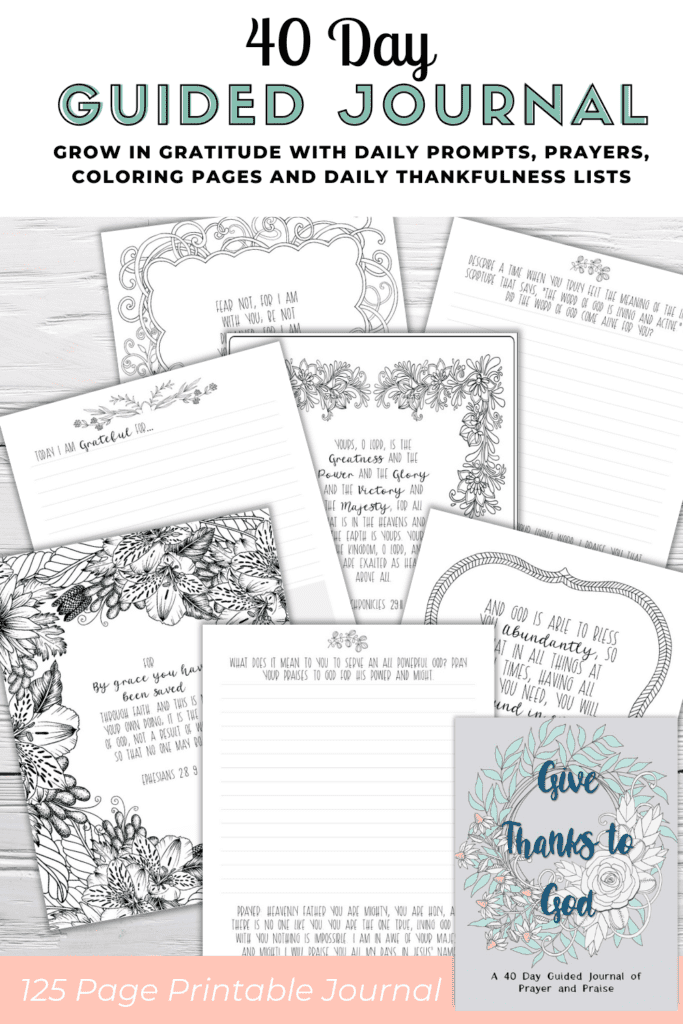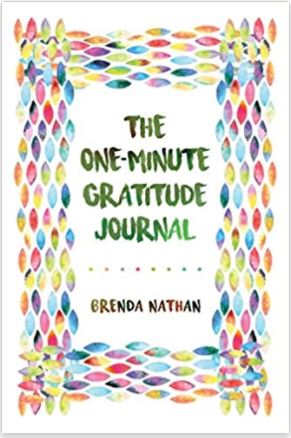Gratitude is the healthiest of all human emotions. The more you express gratitude for what you have, the more likely you will have even more to express gratitude for.
Zig Zigler
Gratitude is a practice that extends to every aspect of self-care. It affects our physical body, our mental health, our emotional intelligence, and our spiritual growth. Gratitude is a powerful multiplier of health in our lives and practicing it is as easy as saying thank you consistently.
There are many ways to practice gratitude, however, Gratitude journaling is one of the simplest ways to consistently practice gratitude. It also happens to be one of my favorites! Keep reading for a complete guide to the what, why, how and benefits of gratitude journaling.

This post may contain affiliate links. That means I may earn a small commission when you click on the links at no additional cost to you. You can read our entire affiliate disclosure here.
What does the Bible tell us about gratitude?
Gratitude is a fundamental aspect of Christianity. It is part of our worship and presents itself from an outpouring of love (Psalm 100:4). The Bible reminds us to be thankful.
1 Thessalonians 5:17-18 “pray continually; give thanks in all circumstances, for this is God’s will for you in Christ Jesus’
Gratitude manifests in our disposition. We thank God for what He gives us on earth and for our lives. We thank Him for blessing us with all good gifts that enable us to fulfill His purposes.
Beyond these blessings, we demonstrate our thankfulness for God’s spiritual blessings.
The greatest spiritual blessing is salvation. A heart of gratitude acknowledges that the sacrifice of Jesus Christ on the Cross is the biggest blessing – “the gift of eternal life” (Romans 5:23). Through Him, we receive salvation and are not condemned to death and eternity in hell. We are free from sin (Romans 5:22) and we exercise our gratitude by giving thanks to God.
We are also thankful for another blessing. The gift to God’s family through faith in Jesus Christ.
Gratitude is not just between us and God. We also have a role to play in appreciating our families, friends, and other loved ones. We need to thank them for their love, gifts, and acts of mercy and kindness. It is our way of acknowledging their efforts and support.
What are the Benefits of Gratitude?
There are many benefits of gratitude that range from intangible shifts of our hearts focus to tangible benefits to our physical and emotional health. Knowing and understanding how being grateful can benefit us is a great encourager to continue to notice the good things. These benefits can be our motivation to continue to use our gratitude journal consistently.
It helps you see God. A thankful heart operates with spiritual eyes. Practicing gratitude helps us see God working in us and to sense His presence in our lives. It opens our eyes to see how He cares for us and protects us.
“Do not be deceived, my beloved brothers. Every good and perfect gift is from above, coming down from the Father of the heavenly lights.” .
James 1:16-17
Gratitude journaling helps us to be content. Gratitude helps us see that we have enough and that God’s grace is sufficient every moment. We learn to be thankful for the blessings that He has given us and become content in the process (1 Timothy 6:6-8).
Gratitude journaling makes us happier. Writing in a gratitude journal creates a positivity loop in our brain. It fills us with more gratitude. This has a positive effect on our mood, emotions, health, and the quality of our relationships.
Gratitude journaling fills us with joy. The gateway to joy is opening your eyes to God’s goodness. When we see His abundant grace and love, our joy overflows.
“The Lord has done great things for us, and we are filled with joy” (Psalm 126:3)
Practicing journaling improves our health. Another one of the benefits of gratitude is that it can improve your sleep, immunity, emotions, and health. Studies show that practicing regular gratitude will improve your immune system, increase our positive emotions (such as optimism and joy), and makes us feel less isolated.
Improves our mental health. Gratitude reduces our anxiety. It teaches us not to worry about an unknown future and pushes us into His hands. We begin to trust that God’s will be done in our future.
Disciplines our thoughts. Being thankful helps us quieten the grumbling thoughts in our minds. Grumbling and complaining is often the result of focusing on our current struggle. Gratitude helps us see beyond our current struggles and releases us from this enslavement. This helps us recover from trauma and adversity much quicker.
“…if anything is excellent or praiseworthy- think about such things.” (Philippians 4:8)
It improves the quality of our relationships. Being thankful and expressing your gratitude to others makes you more social, trusting, and kinder. We are more likely to make new friends and have deep relationships with our current friends if we express our gratitude.
It enhances your self-worth.
Why is Gratitude so Powerful?
Gratitude is a powerful emotion. It allows us to readjust our focus away from the things that are missing and instead press into the things that are going good in our lives. Gratitude journaling simply helps us to have a space where we can tangibly see these blessings. Here are several reasons why gratitude is so powerful:
Gratitude glorifies God. The fact that a thankful heart glorifies Him should be the number one reason for practicing gratitude daily. Gratitude glorifies God because we exalt Him as our Giver. We diminish our egos and focus on what He has done for us instead of His blessings and gifts.
Gratitude aligns us with the will of God. God’s will is simply our obedience to Him and His Word. To be thankful is to obey God’s Word about having a grateful heart. This obedience is our way of showing love to God “in fact, this is love for God: to keep his commands…” (1 John 5:3).
Gratitude journaling helps you navigate the hard times. Being intentional in looking for the positive in life gives you courage and hope. This courage and hope help you go through the hard times.
Practicing gratitude brings peace. The Bible reminds us to count our blessings. It tells us not to worry but be thankful in all circumstances. In this thankful state, we present our prayer needs to God and receive His peace (Philippians 4:6-7).
Showing gratitude to others can improve how they feel and treat those around them. Showing gratitude to our friends, family, strangers, and colleagues does inject a positive spirit in them. You can express this gratitude through acts of kindness, respect, tipping service staff, volunteering, or writing a Thank You note.
Gratitude journaling grows our faith. Keeping a journal or record of God’s faithfulness boosts our faith and helps us persevere in difficult situations. Your gratitude journal should be a written testimony of your best and worst days, and how you saw God’s faithfulness manifest in both cases.
It is our guard against envy. Gratitude helps us see how undeserving we are of God’s goodness. It changes our posture from envy to humility.
What do you write in a gratitude journal?
A gratitude journal is an effective way to write down everything that you are thankful for. If you write an entry in the journal each day, you improve your overall health by 10%.
Oftentimes, we don’t show our gratitude because we think some things are too small. It could be a simple gesture from your neighbor or friend, or that random call from a friend who thinks of us. We talk to them and wish them well. But we rarely sit back and appreciate those who think of us.
A simple appreciation for our gifts and blessings has such a tremendous effect on our emotions. We become happier which in turns increases the feelings of gratitude. The more we express our gratitude, the more we feel it and the longer and intense this air of gratitude becomes.
If you want to trigger that positive loop of gratitude, you need a gratitude journal. The journal could be a simple notebook without a lot of frills. It could also be something structured like a diary with spaces for daily entries and gratitude goals or lessons.
Here are a few tips for what to write in a gratitude journal:
- Write down all your good qualities.
- Write down your prayers – the answered prayers and the unanswered prayers.
- Write gratitude quotes in the journal. These quotes will ground you when you are feeling down.
- Make a list of the people I am thankful for
- Make a list of the things I thank God for.
- Give thanks for a new thing every day.
- Write down the things that you have taken for granted. Alongside each item, write what you will do to help you appreciate God’s blessing.
- Create a gratitude collage. Collect pictures of everything you are thankful for, cut them up, and glue them on the journal.
- Write down your strengths and weaknesses. Focus on the strengths and thank God for the weaknesses. It is in our weakest that He is strong (2 Corinthians 9:10-11).
There is no right or wrong way to write your gratitude journal. I do have some tips to help you write down the things you are thankful for;
- Be specific – write “I am grateful that mom made me tea when I was feeling sick” instead of “I am grateful for mom.”
- Get into the details. Write everything about what or who you are thankful for.
- Be personal. Focus more on the people in your life than the material things you own or have.
- Use the subtraction and addition method. Think about how your life would be without certain loved ones. Also, be thankful for the negative experiences and trauma that you survived.
- Look at good things as blessings or gifts. This will help you not take anything for granted.
- Record unexpected events such as surprise birthdays.
- Be consistent and regular in writing the journal. Commit to writing it at a regular time and day.
My Gratitude Journal Picks
If you are ready to start gratitude journaling I would like to offer a few recommendations for journals to consider
1. Best Blank Gratitude Journal
Many times when it comes to practicing gratitude and using a gratitude journal, simple is best. These Personalized Journals will help inspire you to notice all of the good things that are in your life.
Using one of these journals will not only give you the space to write down the things you are grateful for but the creative liberty to express your gratitude in a way that serves you best.
2. Best Guided Gratitude Journal
With the busyness of everyday life, and the stress that seems to be everywhere, its easy to overlook the many good things in our lives! This guided journal encourages you to take a moment to Creatively Meditate on the word of God, Mindfully Focus on quiet time, and Consistently Reflect on the blessings in your life.
The Give Thanks to God Guided Gratitude Journal was prayerfully created to help you Grow in gratitude with thoughtful morning and evening activities to learn and flourish in Intentional Gratitude.
3. Best List Gratitude Journal
In the One-Minute Gratitude Journal, you have flexibility to write down the dates of entry and not feel guilty if you miss a day. Use the list entries to write down three to five things you are grateful for in this Gratitude journal and turn your ordinary moments into blessings.
35 Additional ways to practice gratitude
Writing in a gratitude journal is not the only way to practice gratitude. Here are 35 more ways to practice gratitude:
- Express your gratitude in handwritten notes. Write down what you appreciate about that person and give the note to them. Try this with our frontline workers during this pandemic. Appreciating their work and the role they play in our lives goes a long way in encouraging them to keep working and serving the community.
- Volunteer your time, finances, and skills in your community. This is a wonderful way to walk with and encourage those around us. You could cook and serve food at a food bank, or take a meal to someone in need.
- Praying for others is a great way to improve our prayer lives and make us aware of the issues people are facing.
- Tip the service staff. If you are at a restaurant or hotel, appreciate the service staff by tipping them.
- Celebrate your wins at home, in the office, or your company.
- Celebrate your family’s wins. Make it a point to thank God when your family’s milestones such as when your children walk, talk, go to school, pass their exams, etc.
- Go for a gratitude walk. Breathe in the fresh air and take in the abundance of nature around you.
- Create a gratitude jar and fill it with your gratitude notes every day.
- Tell someone something good about them and appreciate them for the role they play in your life.
- Unplug from social media and television. Set a time for expressing your gratitude to God in worship.
- Live in the present. Don’t worry about the future or the past. Think about who, what, when, and where you are right now and thank God.
- Purpose not to take anything for granted, including your life.
- Give thanks before you have a meal. Express your gratitude for the people who planted the food, sold it, and finally cooked it. Be thankful for having food to nourish your body.
- Appreciate all the simple things around you. Take time to acknowledge the beauty of nature – the birds, animals, the colors of the sunrise and sunset, the majestic beauty of our beaches and mountains, and the landscape around you. Appreciate God for the air you breathe, access to clean drinking water, clothes to wear, a place to sleep, and for a place you call home.
- Adopt an optimistic approach to life. Focus on the good instead of the bad in every circumstance.
- Write down gratitude affirmations and speak them out daily.
- When envy creeps in, choose to thank God for blessing your neighbors and friends. If you are envious about someone’s marriage and you are single, begin thanking God for the institution of marriage and pray a blessing over their marriage. This will change your mindset and you will find yourself empathizing with others more than envying them.
- Say ‘thank you’ to someone today.
- Do not gossip. Stay away from gossipers because you will be filled with envy and jealousy. Choose to keep positive company.
- Donate your money and time to a charity.
- Call and appreciate your parents
- Leave an encouraging note (physical note or e-note) for someone
- Call and appreciate your friends
- Hug someone today.
- Take on the 21-day complaint free challenge. You cannot complain about anything for 21 days.
- Choose to be thankful for the little or much you have.
- Choose not to act or feel entitled about anything. Remind yourself that all good gifts are from God and that He blesses us as He wishes.
- The gratitude alphabet game. In this game, you think of something to be thankful for based on that is based on the letter of an alphabet. Start from letter A to Z.
- Read inspirational biographies and online stories. Read about the experiences and struggles that different authors have gone through. This will give you a new perspective about your life and prompt you to appreciate your blessings.
- Acknowledge people’s milestones such as wedding anniversaries and birthdays. Send them a special e-card or give them a call. This small act of kindness may make their day and uplift their moods.
- Thank your children.
- Write a positive review of a service or a product you enjoyed.
- Take someone out for lunch or some coffee.
- Buy flowers as a sign of appreciation for your loved ones.
- Spend time with your pets and show them some love.
A point worth noting is that daily gratitude does not produce immediate results. There are no shortcuts. It is not a band-aid when you feel sad. You experience its power and benefits in the long-term.
Practicing daily gratitude takes time. It is a skill that takes weeks to become a habit. Once it becomes a habit, you will find it easier to think or generate gratitude on command. This takes patience, time, and daily practice.
It is my prayer that you have been encouraged to start writing a gratitude journal. I’ve shared insights why gratitude is so powerful and beneficial. Gratitude has immense spiritual, emotional, mental, and physical benefits and power. Try the tips to write a gratitude journal and implement the 35 ways to practice gratitude in our lives. Consider making November your gratitude month and then implement a new gratitude practice each month.
I can not wait to hear how practicing daily gratitude has helped encourage your life!




